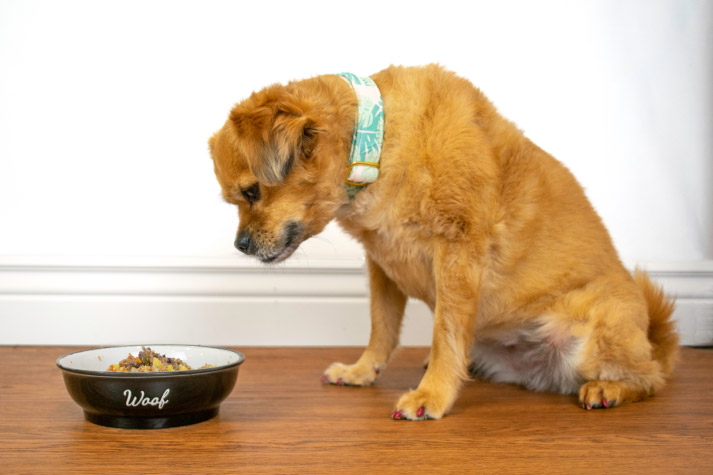
09 Jan
Five Tips to Help Stop Your Dog from Overeating
If you have a dog, chances are that you’ve noticed how food motivated it can be. While behaviour generally varies from dog to dog, we can certainly agree that dogs love to eat. Some dogs will clean their bowls in one sitting like a vacuum cleaner, while others may return to their bowls multiple times throughout the day.
No matter what or when our dogs eat though, one fact remains: we are responsible for the health of our dogs and pets. Most of us are guilty of serving our dog table scraps when they’re lounging near the table or tossing them a treat when they stare at you.
As pet parents, we all want our dogs to live healthy and happy lives. However, many pet parents don’t realize that overeating is among the more serious risks to their pet’s health and can cause a number of medical issues. The good news is that overeating can be controlled by you with a little planning and preparation.
Why Is Overeating Dangerous for My Pet?
Aside from the obvious dangers like unnatural weight gain, there are a range of issues thar can arise from over feeding your dog.
- Obesity: Excess weight poses serious risks to your pet's health, affecting their daily life and longevity. For humans, gaining some weight is not a big deal, but for pets, even a small weight gain is significant because their bodies are much smaller in proportion.
- Bloating & Indigestion: Dogs who overeat or eat too quickly run the risk of experiencing bloating and indigestion. This is especially notable in large dogs like labradors and great Danes. Bloat is dangerous as it means the stomach is under pressure, which can lead to complications and even medical emergencies.
- Joint Issues: Any added weight will slowly but surely start affecting your dog’s joints. If your dog is obese for long enough, it could lead to serious joint issues like arthritis. With larger dogs being prone to joint issues, any added weight only exacerbates the issue.
- Pancreatitis: Serving table scraps has more adverse effects than just weight gain; fatty and spicy foods can cause issues like pancreatitis and serving your dog these foods can quickly lead to complications.
Preventing Overeating with Your Dog
- Measure Portions: Overfeeding is a primary cause of pet obesity. To combat overfeeding, serve measured portions based on your pet's size, breed, and activity level. Eliminate table scraps from your pet’s diet, since they will only cause issues in the future. Consult your vet and get a serving cup with a measure; this way you’ll be able to keep track of exactly how much food you serve your pet and adjust accordingly.
- Stick to Mealtimes: Pets are usually creatures of routine. Try to feed your dog at the same time daily, with set time frames for eating. Drawing out meals and grazing can easily lead to over-eating, especially if you have a self-filling bowl or automated pet feeder.
- Choose a Reputed Food Brand: If you’re going with store bought food, choose a reputable, high-quality pet food brand, as cheaper brands often use fillers and low-quality ingredients. This means little to no nutritional benefits and the risk of unknown health effects. Reputed pet food brands spend time on the research and development of pet foods to provide balanced nutrition.
- Be smart with treats: Treats are an essential part of a pet’s life, but they can also be detrimental to their health if not served sparingly. Make sure to consult your vet about your pet and the number of treats they can have, so you can adjust your pet’s daily treat intake or look for healthier alternatives accordingly.
- Habits & Exercise: Inactivity is one of the main contributing factors toward obesity, so make sure to get that daily exercise with your pet. This can be in the form of walks, games, or playtime with toys. One should develop positive habits too; eliminate table feeding, show constraint when giving out treats, and don’t fall for the puppy dog eyes.
Making a change in your dog’s lifestyle is a gradual process. It takes time, effort, and consistency to make a change, but it certainly is possible. Making sure your dog isn’t overeating will keep your dog healthy, happy, and physically fit for a long time. If you’re ever feeling confused, make sure to consult your vet. They will be more than happy to help you tackle the issue and plan for incremental changes.






AUTHOR’S BIO
Carry My Pet
Passionate pet enthusiasts and globetrotters, dedicated to easing furry friends' journeys worldwide. Penning tales of compassion at CarryMyPet, where every relocation is a tail-wagging adventure.